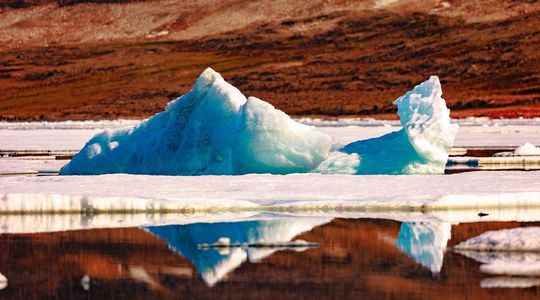The North Pole region is melting silently. The Arctic has warmed nearly four times faster than the rest of the world over the past 40 years, according to the findings of a new study published Thursday in the journal Communications Earth & Environmentof the group Nature. And parts of the region, including the Barents Sea in northern Norway and Russia, are seeing their temperature rise up to seven times faster. These results darken the forecasts a little more and raise fears of an underestimation of the climate models of the poles, whose warming has a major influence on the rise in sea level.
This work thus re-evaluates upwards the rate of warming of the region around the North Pole. Already, in 2019, the United Nations panel of climate experts (IPCC) estimated that the Arctic was warming “more than twice the global average”, as a result of a specific process in the region. In its report published on February 28, the IPCC wrote that “the degradation of the Arctic was one of the ‘ineluctable phenomena'”. And the painting looks worse than the one once drawn, the researchers point out.
One of the results of the rapid warming of the Arctic is the faster melting of the ice sheet – a freshwater glacier – which adds to the rise in sea level. To write up their study, the scientists observed a phenomenon called “Arctic amplification”. The latter occurs when pack ice and snow, which naturally reflect the sun’s heat, melt into seawater. When this happens, the ice reveals darker areas of land or sea, which which causes increased absorption of sunlight and therefore heating. The more the ice melts, the more heat builds up.
The IPCC claims that the sea level has risen by 20 centimeters since 1900. However, the rate of this rise has almost tripled since 1990 and, depending on the scenarios, the oceans could still gain 40 to 85 cm by the end of the century. . The Greenland Ice Sheet, which recent work suggests could be approaching the “tipping point” of melting, contains a quantity of icy water capable of raising the level of the Earth’s oceans by up to six metres. One thing is certain: over the decades, the Arctic sea ice has shrunk to a trickle, according to the scientist Zack Labwhich closely follows the region.
The obsolescence of previous models
To demonstrate the rapid warming of the Arctic, the researchers, based in Norway and Finland, combed through four sets of temperature data collected across the entire Arctic Circle by satellites. Observations start from the years 1979 – when satellite data became available. Conclusion: the Arctic has warmed by an average of 0.75°C per decade. Due to greenhouse gases generated by human activities, mainly by fossil fuels, the planet has already gained almost 1.2°C since the pre-industrial era.
“We compared the observed Arctic amplification ratio with the ratio simulated by state-of-the-art climate models,” the researchers explain in the study. The team found that climate models predicted Arctic warming about a third lower than their own data show. This discrepancy, according to them, could be explained by the aging nature of previous models of the Arctic climate, which are constantly being improved.
If the rate of warming in the Arctic continues to accelerate, the influence on weather patterns could worsen. “For us, the Arctic is a sentinel, since it represents the region of the globe where the effects of climate change will be the greatest in the years to come”, underlined in L’Express Gerhard Krinner, research director at the CNRS at the Institute of Environmental Geosciences in Grenoble, last June. A year ago, scientists were alarmed to see rain falling on the summit of Greenland (3000 meters above sea level), located between the North Atlantic and the Arctic Ocean, because of temperatures above zero degrees. .
The intense warming of the Arctic, in addition to having a significant impact on the population and on the local fauna, which depends on the solidity of the sea ice to hunt, will also have repercussions on the planet. “Climate change is man-made and as the Arctic warms, its glaciers will melt, which will have a global impact on sea levels,” said Antti Lipponen, member of the AFP. Finnish Institute of Meteorology and co-author of the study. “Something is happening in the Arctic and it will affect us all,” he worries.
